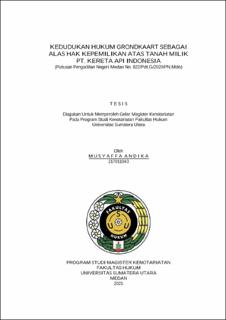| dc.description.abstract | In Indonesia, land holds significant value for society, serving not only as a place of residence but also as a valuable asset or wealth for landowners. The state guarantees and respects land rights granted to its citizens. Various land disputes arise in Indonesia, one of which concerns the ownership and control of state land based on grondkaart, which has not been formally registered or converted in accordance with land rights under the Basic Agrarian Law (Undang- Undang Pokok Agraria-UUPA).
This study employs normative legal research with a descriptive-analytical approach. The data sources consist of primary, secondary, and tertiary data, collected through literature review and field studies using interviews as data collection tools. The collected data is then analyzed qualitatively,
The findings of this study are as follows. First, during the colonial era, agrarian law in Indonesid operated under a dualism system, with both customary" law and Western law in effect. Western land regulations were governed by the Agrarische Wet and Agrarisch Besluit. The grondkaart was a legacy document from the colonial railway company, Staats Spoorwegen (S$), which controlled state-owned (domein) land designated for railway operations. Since the enactment of the UUPA, all Western land rights were required to he converted, and failure to do so resulted in the land reverting to state ownership. Second, after Indonesia's independence, railway companies were nationalized under Law No. 86 of 1958, Government Regulation No. 40 of 1959, and Government Regulation No. 41 of 1959. Based on the UUPA and national treasury regulations, land held under grondkaart by PT Kereta Api Indonesia (Persero) serves only as a document providing information on state-owned assets, rather than conferring proprietary rights. Third, based on the chronological analysis of Decision No. 822/Pd.G/2020/PN.Mdn, the defendant claimed land ownership based on grondkaart while the plaintiff failed to provide evidence of ownership or control. State land documented under grondkaart cannot be leased to third parties without the approval of the Minister of Finance, rendering the defendant's lease agreement with the plaintiff legally invalid. The court's legal considerations acknowledged that grondkaart is not explicitly regulated under the UUPA, yet it was still deemed valid legal evidence. However, grondkaart should be regarded merely as a historical land map from the colonial era, serving only as an informational reference for state assets. | en_US |


